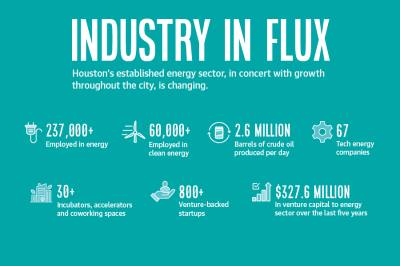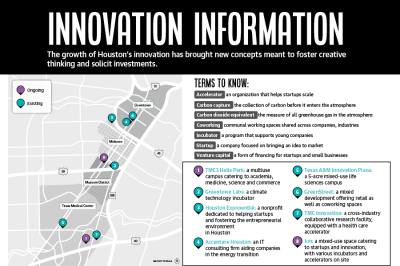Oil companies have propped up Houston’s economy for the last century as the city has amassed one of the largest oil-based economies in the world, economic experts said; however, the narrative around Houston’s energy is starting to shift with the national conversation on the usage of cleaner energy and as innovation alters the status.
Houston has a burgeoning tech sector—which has seen a 45.6% increase in job postings year over year from January-October 2021 and from January-October 2022, according to career site Dice. Industry experts said innovators are flocking to Houston. Bayou City startups received an unprecedented amount of funding in 2021.
Change—such as the Texas Medical Center’s Helix Park—continues to mold the city’s landscape and inform innovation across industries in Houston. These new ways of thinking are also reflected in Greentown Labs, the largest climate tech-focused incubator in the U.S., which is aiding the entrepreneurial community in renewable and sustainable efforts to combat climate change.
The U.S. has a goal of reaching zero carbon emissions by 2050, per the Paris Agreement, an international treaty on climate change benchmarks. In April 2021, President Joe Biden announced a new goal of creating a carbon pollution-free power sector by 2035. Carbon neutrality is becoming less a distant idea and more the city’s near future, said Ramanam Krishnamoorti, University of Houston’s vice president of energy and innovation.
“If Houston and Texas and the nation wants to get to net zero by 2050, we’ve got to start moving on these large-scale projects pretty quickly,” Krishnamoorti said. “And it’s going to cost a lot of money as well as repurposing and retraining people.”
Houston has a total of over 237,000 people employed in the energy sector, and of those, over 60,000 are employed in clean energy, per data from the Greater Houston Partnership.
After a 2021 agreement to push for zero carbon among oil industry titans, the GHP, the Center for Houston’s Future and management consulting firm McKinsey & Co., Krishnamoorti said there is a palpable sense of urgency to change. This change entails not only the city of Houston—as outlined in Houston’s first-ever Climate Action Plan, published in April 2020—but also oil companies and nuclear electric power provider NRG Energy.
NRG, which became Houston based in 2021, is following a science-based goal of limiting the planet’s warmth by 1.5 degrees Celsius. The effects of global warming beyond this benchmark are potentially “devastating,” according to environmental nonprofit Conservation International. NRG is among other industry leaders in Houston, a city historically reliant on oil, looking to limit carbon emissions.
Energy today
Houston’s energy infrastructure is set against that of Texas, one that has become a subject of discussion in recent years, most recently with the February 2021 freeze.
The redesign of the Electric Reliability Council of Texas will potentially appear before the Texas Legislature in the 2023 session. The plan, in part, is tasked with working emerging renewable energy sources into the equation and motivating the development of thermal energy. ERCOT relies on price signaling to encourage generators to go online and offline, said Ed Hirs, a lecturer on energy economics at the University of Houston.
ERCOT data shows there has been a spike in renewable energy usage, such as solar, in Houston, and renewable energy is more reliable than traditional avenues of energy. According to the city’s Climate Action Plan, the number of solar installation permits in the city increased 150% from 2017-18. It is projected to increase by 230% through 2026, per Energy and Environmental Economics Inc.’s November analysis for ERCOT.
“The models that they have considered to date, none of them are going to get us where we need to be,” Hirs said.
This story of keeping up with changes and trying to stay ahead of the curve is seen with Houston’s oil industry. In GHP data released at the annual Economic Outlook on Dec. 8, the state recovered 8.7% more jobs lost in exploration and production and 33.3% more oil field service jobs from January 2020 to October 2022 than the Greater Houston area. Despite this, Houston’s energy industry is still progressing, according to some industry experts, including Krishnamoorti.
Houston has one of the highest greenhouse gas emission rates per capita in the U.S. at 14.9 metric tonnes of carbon dioxide equivalent per capita per year, according to the Climate Action Plan.
“There are multiple vectors that we need to move on in order to make this energy transition happen; there is no single silver bullet,” Krishnamoorti said.
He did, however, mention methods—currently in practice in Houston—of eliminating the carbon footprint. One way is by using carbon capture, a method in which Houston has had “global leadership,” Krishnamoorti said.
Another method is by looking toward cleaner energy altogether. The city’s partnership with retail electric provider NRG has lowered Houston’s effective direct carbon emissions by 85% since 2005, per an August 2021 GHP posting by Maggie Martin, former director of marketing and communications at GHP. NRG has an interim target of reducing carbon emissions by 50% by 2025, according to a December interview with Jeanne-Mey Sun, NRG’s vice president of sustainability, by Lou Ann Duvall, a marketing and communications director at the GHP.
According to the GHP’s Houston Energy Transition Initiative report from June 2021, if Houston does not take action in response to the energy transition, the region could lose up to 650,000 jobs in energy and related fields by 2050.
Simultaneously, if “decisive” action is taken, Houston could see a gain of 560,000 jobs.
Ongoing, future innovation
As one of the most diverse cities in the U.S., Houston is uniquely positioned to cater toward founders of all backgrounds, said Blair Garrou, chair of the Houston Innovation Council, a part of the GHP, and managing director of Mercury Fund, an early-stage venture capital firm.
“We have made more progress in the last five to seven years, I think, than we have in the last 20 years,” Garrou said, attributing recent change to millennials and Generation Z.
Garrou said he believes this pattern of progress, in addition to Houston’s varied population, sets the city up for future success.
“We are seeing an influx of Black and Latino founders move to Houston, not because they’re trying to raise capital, but because of the inclusive nature of the city,” he said. “I think that will continue to happen in 2023.”
Houston companies received $2.02 billion in venture capital in 2021, a “near five-fold” increase from $423 million in 2017, per the GHP’s 2022 Tech Report.
These changes are reflected in mixed-use spaces, such as the Ion, which opened in May, and coworking spaces, such as Spaces and Life Time Work at GreenStreet in downtown. This cross-industry collaboration is also seen through the Texas Medical Center’s 37-acre Helix Park, a campus catering to academia, medicine, science and commerce that will be complete in fall 2023.
Despite recent developments, innovation is nothing new to Houston, said Raymond Hodges, director of IT consulting company Accenture’s downtown Innovation Hub.
“I think the culture of exploration and innovation has always been here,” he said.
In summer 2021, the GHP and other local leaders published a plan to lead the nation toward a goal of zero carbon emissions. Energy companies involved in the transition include Chevron, Conoco Phillips, ExxonMobil, Shell, BP America and Schlumberger, among others, according to David Ruiz, former GHP marketing and communications coordinator.
“I would say, for the most part, companies know what technologies are out there. They know what to do,” he said. “The challenge is how to do it, right? So, we’re really focused on how we support them in identifying how these new technologies can be applied.”
Krishnamoorti said he believes Houston will be at the forefront of change in energy in the future.
“I think we’re starting to see some real significant innovations coming along that will help accelerate the global [energy] transition, but, more importantly, put Houston as [a] front-and-center leader in this space,” he said. “So that global leadership is something that I think you will see Houston develop and deliver in 2023.”







